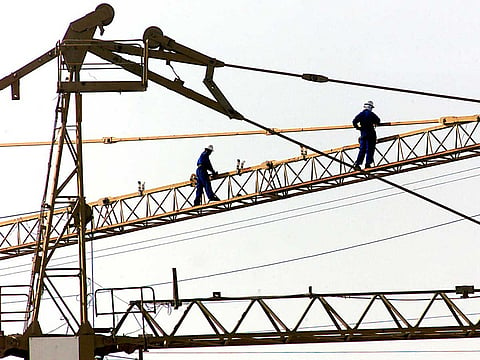Spare a thought for the toiling migrant work force
Much infrastructure in GCC has been built by hard work of guest workers over the years

A recent report in a leading Western newspaper revealed that more than 6,500 labourers from South Asia alone had died in one of the GCC countries in the past 10 years. The report went on to detail that among the dead were 5,927 migrant workers from India, Bangladesh, Nepal, and Sri Lanka. Close to 824 Pakistani workers had also died in the same time. These figures were picked by poring over statistics from embassies in the Gulf country and governments of workers’ home countries.
The GCC has been host to millions of expat workers and the following the oil-boom years of the last century, the bulk of these workers have been the semi-skilled and labour class who were required to fuel the growth that transformed deserts into metropolises.
Tragically, some of the millions died along the way either through natural causes or work-related incidences. But these numbers were real and to their families, could not be simply dismissed simply as statistics. It brought to mind the tragic death and discovery of a Bangladeshi labourer at the bottom of an elevator chute of the university parking facilities at a local university in Jeddah.
The worker who had been apparently working overtime on his own to finish whatever was left had inadvertently slipped down the chute and met his fate. His body was not discovered till almost two weeks later. Cause of death was attributed to malfunctioning equipment.
On reading of the incident Saeed, an engineer wondered how it was technically viable for the doors of an elevator to open with the elevator cage not being there, or was there an element of human error. How could this be an accident if the company responsible for the maintenance of the elevator and surrounding facilities were being provided a satisfactory service report at the end of each month? And how often were these things checked up on anyway? How was it possible to blame this termination of life on equipment failure, when all facts smack of gross negligence on the part of those responsible for the maintenance of such facilities?
Why no accountability?
Another issue raised was why it took the University almost thirteen days to notice and discover a dead and bloated corpse within its own facilities. Weren’t any personnel assigned to monitor the goings-on in such a large complex as a university facility? And if so, were these assigned people doing their jobs? Could they have been too busy drinking tea and reading newspapers in air-conditioned offices to bother making their rounds in the summer heat? Wasn’t there anyone in charge who was supposed to supervise these individuals? Or was it that the supervisors themselves were too busy with their own private agendas elsewhere!
What about the integrity of the contracted company responsible for the shuttling of these labourers back and forth from the job site to their camps? Shouldn’t the bus driver or a foreman have noticed the missing person from day one when there was an empty seat on the bus? And what about this unlucky man’s compatriots? They should have alerted someone when he failed to show up for dinner back at the camp. Or was it that they were too exhausted at the end of a gruelling day to bother? Had the body not continued into advanced stages of decomposition and the foul odour begin to permeate throughout the parking facility. This could have very well been the poor labourer’s final resting-place!
Then there was Mohammed, a trader in foodstuff, who wanted to know why the company hiring this man had not paid workers their dues for months. Could this have contributed to the labourer’s death, forcing him to work extra-long hours to earn any money. That being his only source of income, he had to supplement his normal working duties with additional work on the side. After all, it was probable that he had numerous financial obligations back in his home country, and was under constant pressure to satisfy them.
These labourers worked extremely long hours, and it was easy to dishearten them by not giving them their just dues, Mohammed continued. In most instances, they are forced to find jobs on the side. They have to do whatever is necessary to send money back home. In all likelihood, this poor individual’s case was similar. Working long and tiring hours, he was probably too exhausted to notice the absence of the elevator compartment when the doors opened, sending him to his unfortunate death.
A collection fund was started to be sent to this man’s family whose only means of income in all probability had been abruptly terminated. It was also suggested by one that a marble plaque be placed in the parking structure in the memory of the unknown worker’.
— Tariq A. Al Maeena is a Saudi sociopolitical commentator. He lives in Jeddah, Saudi Arabia. Twitter: @talmaeena






